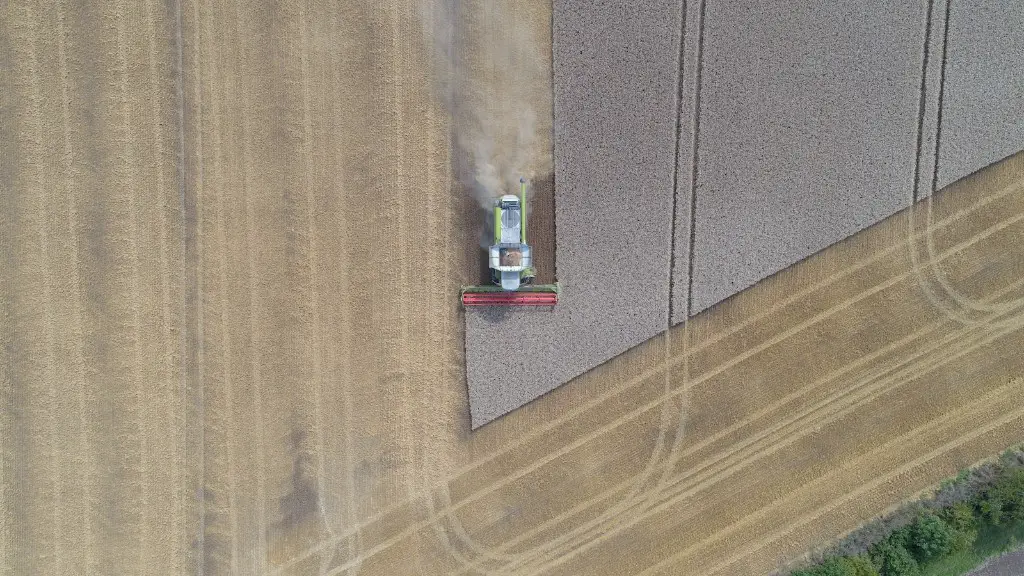Genetic engineering, also referred to as genetic modification, is the process of altering the sequence of nucleotides within an organism DNA in order to change its characteristics. It has had tremendous applications in agriculture, enabling farmers to breed plants and animals with desirable traits. In this post, we shed light on how genetic engineering is useful in agriculture.
For starters, genetic engineering has facilitated the development of drought tolerant crops. In areas where water scarcity is an issue, farmers can deploy genetically engineered crops which can withstand long periods of drought, consequently increasing their harvests. Additionally, herbicide tolerant crops have been developed to enhance the efficiency of weed management, thus enabling farmers to save time, labor and money.
Furthermore, genetically modified (GM) crops have been developed to increase their resistance to pests and diseases, thereby preventing the need for costly pesticides and fertilizers. This not only guarantees a higher yield but also allows farmers to reduce their use of these hazardous chemicals, thereby limiting their potential impact on the environment.
Moreover, genetic engineering has enabled the development of nutritionally enhanced crops. These crops are rich in vitamins, proteins and other essential micronutrients, thus helping to reduce malnutrition and nutrient deficiency. Additionally, researchers have used genetic engineering to develop crops which can survive extreme temperatures and difficult soil conditions, subsequently improving the economic status of small-scale farmers.
Furthermore, genetic engineering has enabled the development of crops which are highly compatible with integrated farming techniques. This includes the cultivation of fish and other aquatic species along with crops which enhance their productivity while improving the ecological balance of water resources. Additionally, genetic engineering has facilitated the development of crops with quicker growth cycles, thus allowing farmers to obtain higher harvests in a shorter period of time.
Finally, genetic engineering has enabled scientists to develop plants which are able to produce higher yields when grown in poor soil conditions. This has been particularly beneficial for farmers in developing countries where fertility levels are often low. Additionally, researchers have used genetic engineering to develop biofuel feeding crops which enable farmers to use their lands for energy production rather than food production.
Herbicide Tolerant Crops
The use of genetic engineering has facilitated the development of herbicide tolerant crops which enable farmers to remove unwanted weeds while protecting the desirable crops. These GM crops are resistant to a broad range of herbicides, and hence, can ensure better weed management with less effort. Additionally, these tolerant crops have been developed to withstand regular tillage and in some cases, the direct application of herbicide to the crop.
What’s more, herbicide tolerant crops also enable increased use of no-till farming practices. This ultimately reduces the amount of greenhouse gases produced as a result of tilling the soil. Additionally, farmers can reduce the amount of water used in irrigation as these crops are usually more drought tolerant. Finally, herbicide tolerant crops also prove to be extremely beneficial for large-scale planting operations as they simplify the weeding process.
Virus Resistant Crops
Genetic engineering has enabled the development of virus resistant crops which allow farmers to thwart damaging viruses which can reduce yields significantly. These virus-resistant crops are able to recognize and respond to particular virus patterns, consequently leading to significant yield increases. Furthermore, these crops are usually able to survive severe weather conditions without suffering considerable damage.
What’s more, virus resistant crops limit the introduction of foreign DNA into the crops, thus ensuring its safety and quality. Additionally, these crops are integral to better pest control, as they can adapt quickly to new insects or other pests and respond quickly to pest damage. Finally, these crops can also help reduce the cost of labor and input expenses, thus allowing farmers to improve the profitability of the crop.
Insect Resistant Crops
Genetic engineering has enabled the development of plants which are able to withstand the damage caused by certain insects. These insect resistant crops have been developed to limit the need for insecticides, which can be extremely harmful to the environment. Additionally, these GM crops also have improved shelf life as they require less chemical treatment.
Furthermore, insect resistant plants can offer farmers higher yields by preventing insect damage. In addition, these plants are often able to resist diseases that can reduce the quality and quantity of the yield. Finally, insect resistant crops can improve food safety by reducing the amount of contaminants present in food products.
Nutritionally Enhanced Crops
The use of genetic engineering has enabled scientists to develop nutritionally enhanced crops which are rich in essential vitamins, proteins and other micronutrients. These crops can be a valuable addition to the diets of those suffering from undernourishment. Additionally, these nutritionally enhanced crops can reduce the number of nutrients lost in processing, improving their nutritional value.
What’s more, these enhanced crops can enable farmers to improve the growth rate of their livestock, as well as the nutritional quality and yield of their animals. Furthermore, these crucial crops can help improve the health of those consuming them, thereby reducing the risk of certain illnesses and diseases. Finally, nutritionally enhanced crops can improve the economy and nutrition security of developing countries by providing nutrient-rich food at low prices.
Pharmaceutical Crops
Genetic engineering has enabled scientists to develop pharmaceutical crops, which have the ability to produce pharmaceutical drugs and other biologics. These crops can offer an important alternative to traditional manufacturing techniques, as they require fewer resources and time to obtain the desired product. Additionally, they offer a higher level of safety and predictability than other methods.
Furthermore, pharmaceutical crops can be more cost effective than traditional methods, as they require less infrastructure and personnel. In addition, these crops offer greater levels of control than other methods, allowing scientists to achieve a high degree of precision. Finally, pharmaceutical crops provide an effective platform for producing specialty drugs which may be too expensive to manufacture using traditional methods.



